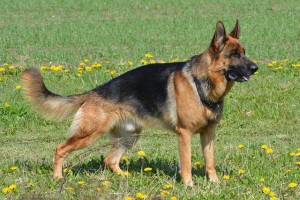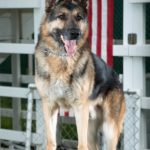A Shepherd on the Front Lines
It isn't uncommon to see a German Shepherd working with law enforcement agencies to solve crimes. This breed is most commonly chosen to work with law enforcement agencies because of their temperament, intelligence and ability to successfully complete tasks.

One of the main reasons police utilize German Shepherds is for their keen sense of smell. K9 officers utilize the dog’s nose, which is extremely sensitive, to sniff out contraband of all different sorts, including drugs and bombs. The dog will walk around an area and give the officer a signal that he or she has been trained to do when a gun, bomb or drug is found. Common signals include sitting down or scratching at an area that contains contraband.
Not all dog breeds can be taught to do this because they're not as intelligent as German Shepherds. Police agencies require intensive training for each K9 before the dog can begin work; in addition to their natural abilities, the training helps them to successfully detect things that humans and other dog breeds cannot.
Many law enforcement dogs work long shifts with their handlers, but that's just fine with them. A German Shepherd’s willingness to work is part of the breed's DNA. They were bred to work in the 1800s and that enthusiasm is still relevant in the temperament of today's dogs.
Work is defined as completing tasks for rewards, and these dogs are highly reward-driven. Tennis balls are often used as rewards because these dogs love to play. German Shepherds are considered a high-energy breed, making it easy for them to keep up with one task after another task is thrown at them. And doing miles of walking or running each day doesn't seem like work, but more like play, to this breed. In addition to wanting to work, they are highly intelligent and are able to learn and retain a variety of commands.
Watch this amazing video about the Dog That Cornered Osama bin Laden. Cairo is a Belgian Malinois, which is often mistaken as a German Shepherd due to its appearance. Police and Military dogs are typically German Shepherds or Belgian Malinois, due to their intelligence. A Belgian Malinois, however, is much smaller in stature and is perfect for more covert operations.
Law enforcement officials see the breed's body as another bonus to doing police work. German Shepherds are built to be agile and swift. They can catch up to a suspect much faster than a police officer on foot, and they have the strength and discipline to take a person down to the ground and wait for a command. They are also fiercely loyal and protective, which works in the favor of the handling officer if he or she walks into a dangerous situation. The dogs often wait for commands and can be called on or off with the use of one word. This is a powerful tool for law enforcement officials as they approach unknown situations because the dog can work as a partner and second set of eyes to alert the officer to any danger.
We can’t forget to mention one of the biggest advantages of working with a German Shepherd dog: he or she often becomes a protector over an entire home and family. This makes the dog into a companion for the officer who transitions each day from work to home with their best friend.
Article By:
Lindsay Machak
Picture from Pixabay, Edited by Guild Staff






